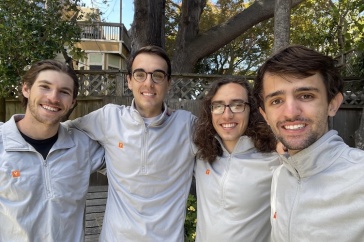
Madison Schaefer '16 will present her thesis, "The Joy of Melancholy," at the Honors English Undergraduate Research Conference.
“Our fantastic civilization has fallen out of touch with many aspects of nature, and with none more completely than with night.”
So Henry Beston’s acclaimed work, “The Outermost House: A Year of Life on The Great Beach of Cape Cod,” suggests in its examination of the value of dark places.
“With lights and ever more lights, we drive the holiness and beauty of night back to the forests and the sea; the little villages, the crossroads even, will have none of it,” Beston wrote almost 90 years ago.
Madison Schaefer ’16 first read Beston’s words last spring during her honors English seminar, Literature of the Cabin in the Woods, Contemporary Memoir with professor Diane Freedman. Decades after they were first published in 1928, she says, they are even more applicable.
From the springboard of such literary explorations of the value of darkness, Schaefer dove into her thesis, “The Joy of Melancholy,” which she will share at the Undergraduate Research Conference in April. Given the inspiration she found in the class, and Freedman’s particular areas of expertise, Schaefer decided to work with Freedman as her advisor for the project.
Sitting at a window table in a Durham café on a rainy Monday afternoon, Schaefer, who is majoring in both English and justice studies, talks about how she decided to delve into her topic and the connections she has found between light pollution and the subjugation of our darker emotions.
“In our society, there is an obsession with always being happy and denying the darkness in our lives.”
“In our society, there is an obsession with always being happy and denying the darkness in our lives,” she says. “It makes you think that everyone else is always happy and wonder, ‘Why am I the only one who is sad?’”
However, she explains, the timeless works of authors like Walt Whitman attest to the power of melancholy, sadness, darker emotions.
“So much of their creativity comes from times when they were depressed and from emotions other than joy. By denying those parts of yourself, you’re repressing the essential other half of your life,” she says, suggesting society dictates, “It’s not OK to show it, but it is okay to write about it.”
In her research, Schaefer began to find connections between repressing darkness in an emotional sense and the banishment of actual darkness through brightly illuminated cities, towns, highways and walkways. There’s Whitman’s perspective on night — that darkness itself empowers literature — in the context of an age of light pollution. There’s data linking the suppression of negative emotions and lack of time spent in darkness to issues like mental health struggles.
While she was researching the literary and scientific correlations between the two sides of the emotional spectrum — joy and melancholy — and the value of daylight and darkness, Schaefer found there was more information than she could possibly use in one thesis.

Ultimately, she chose to focus on the night imagery within the writings of Whitman and Beston alongside an examination of works by more current writers on suppressed melancholy and the correlations with light pollution.
Thinking back to her first reading of Beston’s work in her seminar class a year ago, Schaefer describes her memory of his descriptions of “the reverence you feel when you look at the stars.”
To sum it up in the simplest terms, she says, she thinks of one description she found in her research: a future where children still sing the nursery rhyme “Twinkle, Twinkle Little Star” but have no idea what it means.
Through her membership in the International Dark-Sky Association, Schaefer has learned a lot about the issue. Growing up in Vermont and having visited New Zealand, she says, she has been fortunate to see the multitude of stars that can only be witnessed at specific levels of darkness. However, she adds, she has met many people during her college years who told her they have never seen such things.
“Light pollution is a problem that we can solve,” Schaefer says, “and fixing this can improve our minds and our ecosystems.”
The most surprising part of her project, she says, was discovering how much she enjoyed the investigative process itself.
“I found that I loved research,” she says, describing how one source would lead to another and she would “journey down a rabbit hole” to discover more connections, adding she would have loved to spend even more time immersed in the research before beginning her writing process.
The 17th Annual URC will be held April 11-23. Schaefer will present her research at the Honors English URC, which will be held in MUB Theatre 1 on April 22.
-
Written By:
Jennifer Saunders | Communications and Public Affairs | jennifer.saunders@unh.edu | 603-862-3585


















































